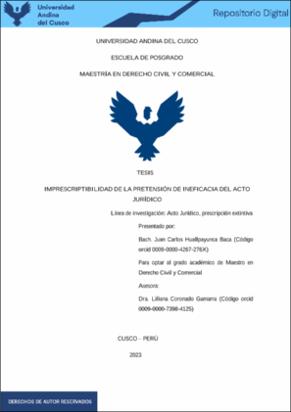| dc.contributor.advisor | Coronado Gamarra, Liliana | |
| dc.contributor.author | Huallpayunca Baca, Juan Carlos | |
| dc.date.accessioned | 2024-04-29T15:42:10Z | |
| dc.date.available | 2024-04-29T15:42:10Z | |
| dc.date.issued | 2023-12-07 | |
| dc.identifier.uri | https://hdl.handle.net/20.500.12557/6294 | |
| dc.description.abstract | El objetivo de la presente investigación es analizar los fundamentos jurídicos y doctrinarios
que sustentan la tesis de imprescriptibilidad de la pretensión de ineficacia en sentido
estricto, asimismo se analizó si corresponde o no aplicar plazo prescriptorio a la pretensión
de ineficacia del acto jurídico, se identificó los efectos que produce la prescripción de la
pretensión de ineficacia de acto jurídico y se fundamentó por qué un régimen prescriptorio
alienta el obstruccionismo del derecho de acción, teniendo como resultado que los
fundamentos jurídicos doctrinarios, que sustentan la imprescriptibilidad de la pretensión
de ineficacia del acto jurídico, son: la naturaleza declaratoria de la acción de ineficacia, la
no aplicación de la analogía, la autosuficiencia normativa, que corresponde a la hipótesis
planteada. Para cuyo efecto se utilizó el tipo de investigación jurídica dogmático analítico
en tanto pretende analizar elementos dogmáticos y jurisprudenciales, con el propósito de
dar a conocer la contradicción en la emisión de fallos judiciales, así como, los avances
doctrinarios con relación a la prescripción o no de la pretensión de ineficacia en sentido
estricto.
Las principales conclusiones son: La ineficacia en sentido estricto es una pretensión de
carácter imprescriptible; es incorrecto la aplicación analógica de la ley en los supuestos de
normas autosuficientes, así como de aquellas que restringen derechos, como ocurre en la
casuística de la presente investigación, al tratarse de normas que fijan plazos prescriptorios
y que además de concurrir lo detallado precedentemente, afecta la libertad de las partes; el
régimen prescriptorio a la pretensión de ineficacia en sentido estricto, vulnera el contenido
constitucional del derecho de acción, que además debe ser entendido como integrante del
derecho a gozar de una tutela jurisdiccional efectiva. | es_PE |
| dc.description.abstract | The objective of the present investigation is to analyze the legal and doctrinal foundations
that support the thesis of imprescriptibility of the claim of ineffectiveness in the strict sense,
it was also analyzed whether or not it is appropriate to apply a prescriptive period to the
claim of ineffectiveness of the legal act, the effects produced by the prescription of the
claim of ineffectiveness of a legal act and it was substantiated why a prescriptive regime
encourages obstruction of the right of action, resulting in the doctrinal legal foundations,
which support the imprescriptibility of the claim of ineffectiveness of the legal act, are: the
declaratory nature of the action of ineffectiveness, the non-application of the analogy, the
normative self-sufficiency, which corresponds to the hypothesis raised. For this purpose,
the dogmatic analytical type of legal research was used as it aims to analyze dogmatic and
jurisprudential elements, with the purpose of making known the contradiction in the
issuance of judicial rulings, as well as the doctrinal advances in relation to the prescription
or not. of the claim of ineffectiveness in the strict sense.
The main conclusions are: Inefficiency in the strict sense is an imprescriptible claim; The
analogical application of the law is incorrect in the cases of self-sufficient norms, as well
as those that restrict rights, as occurs in the case of the present investigation, since these
are norms that establish prescriptive deadlines and that, in addition to what is detailed
above, affects the freedom of the parties; The prescriptive regime for the claim of
ineffectiveness in the strict sense violates the constitutional content of the right of action,
which must also be understood as part of the right to enjoy effective jurisdictional
protection. | en_US |
| dc.format | application/pdf | es_PE |
| dc.language.iso | spa | es_PE |
| dc.publisher | Universidad Andina del Cusco | es_PE |
| dc.rights | info:eu-repo/semantics/openAccess | es_PE |
| dc.rights.uri | https://creativecommons.org/licenses/by-nc-nd/4.0/ | es_PE |
| dc.subject | Ineficacia en sentido estricto | es_PE |
| dc.subject | Prescripción | es_PE |
| dc.subject | Analogía de la ley | es_PE |
| dc.subject | Tutela jurisdiccional efectiva | es_PE |
| dc.title | Imprescriptibilidad de la pretensión de ineficacia del acto jurídico | es_PE |
| dc.type | info:eu-repo/semantics/masterThesis | es_PE |
| thesis.degree.name | Maestro en Derecho Civil y Comercial | es_PE |
| thesis.degree.grantor | Universidad Andina del Cusco. Escuela de Pos Grado | es_PE |
| thesis.degree.discipline | Derecho Civil y Comercial | es_PE |
| dc.publisher.country | PE | es_PE |
| dc.subject.ocde | https://purl.org/pe-repo/ocde/ford#5.05.00 | es_PE |
| renati.advisor.dni | 23987320 | |
| renati.advisor.orcid | https://orcid.org/0009-0000-7398-4125 | es_PE |
| renati.author.dni | 75540284 | |
| renati.discipline | 422087 | es_PE |
| renati.juror | Rios Mayorga, Julio Trinidad | |
| renati.juror | Rivero Ynfantas, Fernando | |
| renati.juror | Avendaño Uchuya, Oswalt Nestor | |
| renati.juror | Chuquimia Hurtado, José | |
| renati.level | https://purl.org/pe-repo/renati/level#maestro | es_PE |
| renati.type | https://purl.org/pe-repo/renati/type#tesis | es_PE |




